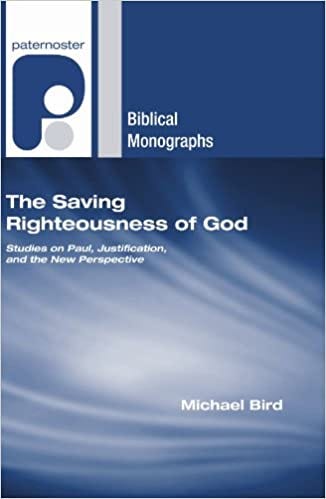The Story of My Books # 2 - The Saving Righteousness of God
The Saving Righteousness of God: Studies in Paul, Justification and the New Perspective (PBM; Carlisle, UK: Paternoster, 2007).
My second book was a series of short studies on Paul, justification, and the New Perspective. It was a book that caused a big stir in some circles and got a good bit of attention.
During my doctoral studies on Jesus and the Gentiles, I decided to branch out and write a few articles on Paul.
I wrote my Honours thesis on the relationship between resurrection and justification in Pauline soteriology. See e.g., Rom 4:25 - “He was handed over for our sins and raised for our justification” what does the “for” mean here? I also came across the work of Markus Barth on this subject which began for me a long appreciation of Barth the younger!
I had just began wrestling with the New Perspective on Paul (NPP), I was partly mortified by it (how can the Reformers be wrong?) but also intrigued by and attracted to it (it made better sense historically). So I wanted to get my own thoughts in order on the subject, which is why I decided to write on the NPP. At the same time, there were debates in popular evangelicalism about “imputation,” i.e., justification is the imputation of the active obedience of Jesus to believers. Scholars like Robert Gundry, Mark Seifrid, N.T. Wright, Michael Horton, and D.A. Carson were frolicking about on that topic.
In the book, I argued that:
The righteousness of God was not a righteousness from God or simply God’s covenant faithfulness. It is a comprehensive term for God’s saving power. Yes, there is a righteousness from God (see Phil 3.9). Yes, God’s righteousness includes his fidelity to his people (see Isaiah). But divine righteousness is a big bucket carrying lots of things in it and some things are emphasized depending on the context.
I also came up with a definition of justification that takes into account the soteriological content and ecclesiological context where Paul argues for it: Justification is an act where God creates a new people, with a new status, in a new covenant, as a foretaste of the new age.
On resurrection and justification, I contended that Christ was justified in his resurrection, therefore, union with Christ means that we participate in the Messiah’s justification/vindication.
If that point is true, it means that justification is about union with Christ and the problem with “imputation” is that it treats justification as Christ’s merit, like frequent flyer points, which are imputed to us, yet in abstraction from a doctrine of union with Christ. There is no text that says that Jesus’s obedience is imputed to believers, none, zip, nada. But, if you were to ask, “How does union with Christ make us righteousness?” Well, in that case, imputation might be a theological implicate of union with Christ. That is why rather than speak of the imputation of Christ’s righteousness, I prefer to refer to incorporation into the righteousness (vindication) of Christ.
On the NPP, in sum, it was often correct in what it affirmed (not all Judaism was legalistic, justification is about Jew and Gentile unity, and 16th-century categories might not be what Paul is talking about). But, the NPP could be wrong in what it denied (some Jews were more emphatic in Torah observance as the basis for salvation, works of the law are more than boundary markers, and Paul does treat the problem of individual sin, i.e., God justifies the ungodly). I got a reputation for being one of the authors in the 00’s who was genuinely trying to hold together the best parts of the Reformation reading of Paul (i.e., salvation by grace), but also recognizing that Paul was ultimately dealing with a very real local problem (i.e., do Gentiles have to become Jews in order to become Christians). It was my sympathetic Reformed reading of the NPP that showed that a via media was possible.
Finally, I also dealt with the topic of how, in Paul’s mind, believers are justified by faith yet judged according to works. In a nutshell, good works demonstrate the integrity of the faith that we profess!
So my SROG book earned me a lot of friends about young and emerging Pauline scholars, recruited a few very, very animated detractors, and it helped me establish some good conversations with the NPP crowd. I’m quite proud of some of the positive mentions the book has had with scholars like Stephen Chester, Kevin Vanhoozer, Scot McKnight, N.T. Wright, Michael Gorman, and Garwood Anderson.
Otherwise, see my earlier blog post, Is the New Perspective Heretical?



"union with Christ means that we participate in the Messiah’s justification/vindication."
Are you saying that you think that is all what union means, or are you saying that part of such union includes participating in His justification/vindication?